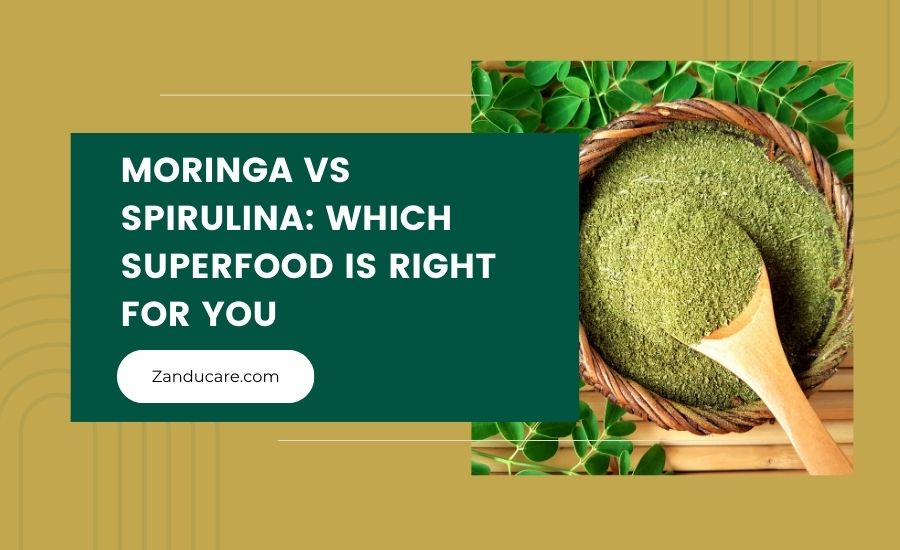
Moringa vs Spirulina: Which Superfood is Right for You?
Superfoods have become increasingly popular in recent years, as people seek out nutrient-dense foods to improve their health and well-being. Two of the most talked about superfoods are Moringa and Spirulina, often touted as miracle foods with numerous health benefits. But which one is right for you? Let's dive into the world of moringa vs spirulina which is better.
Nutritional value of Moringa powder vs Spirulina
Here are the spirulina vs moringa nutrition value: -
|
Spirulina |
Moringa |
|
|
Protein |
5.75 g |
2.7 g |
|
Calcium |
174 mg |
12 mg |
|
Iron |
15.8 mg |
2.85 mg |
|
Vitamin A |
910iu |
57 iu |
|
Fiber |
3.3 g |
0.36 g |
|
Sodium |
2 mg |
105 mg |
|
Potassium |
140 mg |
136.3 mg |
|
Carbohydrate |
5.1 g |
2.39 g |
|
Calories |
35 |
29 |
|
Vitamin C |
0.99 mg |
1.01 mg |
What is Spirulina?

Spirulina is a type of blue-green algae, or cyanobacteria or cyanophyta, that develops in alkaline water bodies. It is estimated that the existence of this microalga dates back approximately 3.5 billion years. Additionally, it is believed that the Aztecs made the initial discovery of it approximately 400 years ago, and they have been using it as a food source for centuries.
Many space research agencies, like the National Aeronautics and Space Administration (NASA) and the European Space Agency, have acknowledged the nutritional richness of this food in the present era of scientific advancements. It has been classified as one of the viable, sustainable food sources that astronauts may grow and consume during extended space missions.
|
Did You Know
|
Health benefits of Spirulina
Reduces cholesterol
Spirulina supplements seem to be beneficial for lowering cholesterol and improving metabolic health overall, according to encouraging evidence. A 2013 study examined individuals with recently increased cholesterol. According to the study, taking 1 gram of spirulina everyday for three months as a supplement reduced total cholesterol and triglyceride levels. A 2019 meta-analysis also discovered that using spirulina supplements lowered overall cholesterol.
Anti-cancer properties
Preliminary investigations in the laboratory and animal models indicate that spirulina may offer anti-cancer properties. It might show potential in the treatment of oral cancer, tumour reduction, and cancer prevention. However, additional research on this benefit using human subjects is urgently needed.
Blood sugar control
Several studies have shown that spirulina may help reduce fasting blood sugar levels. People with type 2 diabetes might benefit from this. However, more research is required before adopting this as a diabetes treatment.
May help with weight loss
Obese individuals may benefit from consuming spirulina. Spirulina may lower body fat percentage and waist circumference in overweight individuals, according to a 2019 systematic study. Nevertheless, as this meta-analysis only included five studies, more research is required to fully understand how spirulina may aid in weight loss.
What is Moringa?
The plant species known botanically as Moringa Oleifera, or just Moringa, is native to the Indian subcontinent but can also be found growing in many other tropical and subtropical areas of Asia and Africa. It is also known by a variety of names, including drumstick tree, benzolive tree, horseradish tree, and ben oil tree, to mention a few.
For ages, people have utilised the leaves, roots, seeds, and flowers of the moringa plant for culinary and medicinal uses. The majority of moringa supplements on the market are made of powdered leaves.
Health benefits of Moringa

Fight inflammation
The body's natural reaction to pain and injury is inflammation. Because moringa leaves contain isothiocyanates, they have anti-inflammatory properties. They possess Niazimicin, which is known to stop the growth of cancer cells. Numerous illnesses, including cancer, rheumatoid arthritis, arthritis, and several autoimmune diseases, are mostly brought on by inflammation. The body experiences higher inflammation when we are injured or infected.
In essence, it serves as a defence mechanism against trauma, but an unhealthy diet and lifestyle can cause the body's levels of inflammation to rise. Prolonged inflammation results in long-term health problems. Consuming leaves of the moringa plant lowers inflammation.
Lower blood sugar levels
Individuals who have persistently elevated blood sugar levels eventually develop diabetes. Diabetes, in turn, can harm the body's organs and result in heart issues. It's best to maintain controlled blood sugar levels to prevent this. Because moringa leaves contain isothiocyanates, which help to balance blood sugar levels, they are an ideal resource for that.
Protects the liver
Moringa leaves offer considerable value for tuberculosis patients since they lessen the side effects of anti-tubercular medications. The leaves quicken the liver cells' healing process. High levels of polyphenols found in the leaves can both prevent and even lessen oxidative liver damage. They cause the liver's protein levels to rise.
Liver function includes blood cleansing, lipid metabolism, and food absorption. Normal liver enzyme levels are necessary for liver function. Stems of moringa stabilize these liver enzymes.
Moringa powder vs Spirulina protein
|
Aspect |
Spirulina |
Moringa |
|
Source |
Blue-green algae found in freshwater and saltwater bodies |
Tree leaves and pods of the Moringa oleifera tree |
|
Nutritional Content |
High in protein, vitamins, minerals, and antioxidants |
Rich in vitamins, minerals, antioxidants, and protein |
|
Protein Content |
Contains about 60-70% protein by weight |
Contains about 30-40% protein by weight |
|
Vitamin Content |
Rich in vitamin B12, beta-carotene, and vitamin K |
High in vitamin C, vitamin A, and vitamin E |
|
Mineral Content |
Contains iron, calcium, magnesium, and potassium |
Contains iron, calcium, potassium, and zinc |
|
Antioxidant Properties |
Contains phycocyanin, chlorophyll, and beta-carotene |
Contains quercetin, chlorogenic acid, and kaempferol |
|
Health Benefits |
Supports immune function, improves energy levels, aids in detoxification |
Boosts energy, enhances cognitive function, reduces inflammation |
|
Potential Side Effects |
May cause gastrointestinal issues or allergic reactions |
May interact with medications or cause digestive upset |
|
Form |
Available in powder, tablet, and capsule forms |
Available in powder, capsule, and tea forms |
|
Taste |
Earthy and slightly fishy taste |
Mildly earthy with a hint of bitterness |
|
Cultivation |
Grown in controlled environments or harvested from natural sources |
Grown in tropical and subtropical regions worldwide |
|
Environmental Impact |
Requires less land and water compared to traditional agriculture |
Requires minimal water and can be grown in arid regions |
|
Cost |
Generally affordable, price varies depending on the brand |
Typically inexpensive, price varies based on form and quality |
|
Usage |
Often used as a dietary supplement or added to smoothies |
Utilised in cooking, teas, and as a dietary supplement |
|
Regulation |
Regulated as a dietary supplement by health authorities |
Subject to regulations regarding food safety and quality |
Conclusion
There are several similarities and distinctions between Spirulina vs Moringa for iron. They both have outstanding therapeutic qualities and unmatched nutritional content, providing a host of remarkable health advantages. Additionally, selecting one over the other is contingent upon a person's response, particular needs, and health objectives.
FAQs
1. Can you take spirulina and moringa at the same time?
Spirulina binds to toxins and heavy metals to aid in detoxification. The benefits of moringa for digestion are well-known; it lowers inflammation and promotes healthy gut flora. They work well together to improve and cleanse digestion.
2. How long does it take for spirulina powder to work?
You won't notice an increase in energy for one to three weeks. Individual differences exist in the outcomes, which are clearly influenced by your health.
3. Can moringa be taken everyday?
Regular consumption of moringa may result in modest reductions in cholesterol and blood sugar levels. Because moringa leaves are so nutritious and may be eaten on a daily basis, they are especially helpful for those who are deficient in certain vital elements.
4. What is the best time to take spirulina?
It is advised to consume spirulina with water or fruit juice around 30 minutes before exercise in order to reap the benefits of spirulina both before and after exercise. This will enable the spirulina to be absorbed by the body and converted into energy for exertion.
5. Can spirulina help with sleep?
It is thought that a particular amino acid found in spirulina is highly effective in assisting the body in producing melatonin, a hormone that promotes sleep.
6. Which is better, spirulina or moringa?
Both spirulina and moringa are full of antioxidants. On the other hand, they both have a variety of antioxidants, spirulina is marginally less potent than moringa. Spirulina has nearly half of the over 40 known antioxidant chemicals found in moringa.
7. Can I take moringa on an empty stomach?
Generally speaking, the optimum times to consume moringa tea to lose weight are in the morning or right before meals. When paired with a nutritious diet and regular exercise, consuming it when empty may assist in increasing metabolism and encourage a feeling of fullness, hence aiding in weight management.
8. Why is spirulina famous?
A "superfood" known for its possible health benefits is spirulina. It is a blue-green algae that contains numerous vital nutrients.
9. Is spirulina good for hair?
Many people use spirulina to promote hair development and treat hair issues like baldness and thinning hair. Amino acids, essential fatty acids, beta-carotene, and vitamin A are all found in spirulina and are all very good for hair.
10. What to avoid when taking moringa?
There may be interactions between moringa and blood pressure, thyroid, and diabetic drugs. Therefore, if you are using such medications, it would be appropriate to ask Zanducare experts or doctors if consuming Moringa is safe.
References
- Many space research agencies, like the National Aeronautics and Space Administration (NASA) and the European Space Agency, have acknowledged the nutritional richness of this food in the present era of scientific advancements. (https://www.researchgate.net/)
- Preliminary investigations in the laboratory and animal models indicate that spirulina may offer anti-cancer properties. (https://www.researchgate.net/)
- It is also known by a variety of names, including drumstick tree, benzolive tree, horseradish tree, and ben oil tree, to mention a few. (https://www.researchgate.net/)
- Because moringa leaves contain isothiocyanates, which help to balance blood sugar levels, they are an ideal resource for that. (https://www.researchgate.net/)
- Moringa- High in vitamin C, vitamin A, and vitamin E. (https://www.researchgate.net/)




